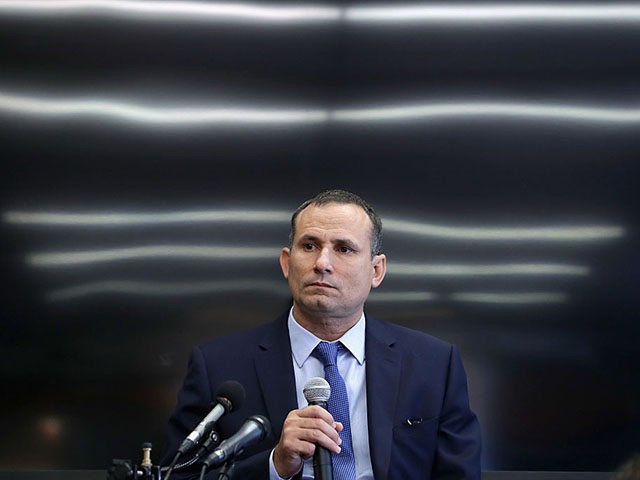Police in Cuba raided the headquarters of the dissident group Patriotic Union of Cuba (UNPACU) on Tuesday, arresting its leader, José Daniel Ferrer, a day after an Amnesty International report revealed “the state’s tactics have stayed almost exactly the same” for decades to silence dissent.
Amnesty International certified the political prisoner status of five men imprisoned for expressing disagreement with Cuba’s communist regime, two of which are members of UNPACU. The group is believed to be the largest dissident group on the island and boasts over 3,000 members nationwide.
Cuban Prisoners Defenders, an organization with ties to the Prisoners Defenders International Network that advocates for human rights for imprisoned dissidents, cooperated with Amnesty International to conduct the research necessary to confirm the political prisoner status of the five men certified on Monday. Javier Larrondo, one of the Cuban Prisoners Defenders coordinators on the island, is a member of UNPACU.
Cuba steadfastly denies the existence of political prisoners in the country, claiming that those convicted of crimes like “contempt” and “social dangerousness” are true threats to society. Cuban dictator Raúl Castro famously denied the existence of political prisoners during a press conference in 2016 alongside President Barack Obama in Havana. Asked by CNN journalist Jim Acosta, a Cuban-American, about human rights violations against political prisoners, Castro asked, “What political prisoners?”
“Give me a name, or names, or after this meeting is over you can give me a list of political prisoners and if we have those political prisoners they will be released before tonight ends,” Castro claimed. Human rights organizations promptly released lists of dozens of political prisoners on the island, but Castro ignored them.
Many in the international community believe Castro has left power since appointing deputy Miguel Díaz-Canel president of the country in 2018. Castro, however, retains the two most powerful titles in the country: commander-in-chief of the armed forces and chairman of the Communist Party of Cuba. The Cuban constitution states that the party leadership outranks all official federal government positions, including that of “president.”
UNPACU member Katerine Mojena alerted the world on Twitter Tuesday of the police raid on UNPACU’s headquarters in eastern Oriente province, accusing police of “abducting” Ferrer and several other activists.
“They stole various laptops, telephones, and medicines and bedsheets,” Mojena wrote, adding that Ferrer has a three-month-old child for whom UNPACU’s remaining leadership is “concerned.”
#Cuba Secuestrado líder d #UNPACU José Daniel Ferrer y otros activistas. Robaron varias laptop, teléfonos e incluso medicinas y sábanas. Continuamos sin servicio d telefonía y mensajería móvil. Nos preocupa @NelvaIsmarays y su bebé d 3 meses que aún es lactante. #CubaDecide pic.twitter.com/n6XkqhGmq5
— Katerine Mojena (@KataCuba) August 27, 2019
The U.S.-based Martí Noticias outlet confirmed Ferrer’s arrest on Tuesday with other UNPACU members, including 16-year-old son José Daniel Ferrer Cantillo.
“They came in at 6:30 a.m., broke through all the doors and pushed up against the wall all the activists that were there at the headquarters,” the younger Ferrer told Martí. “They began searching everything, they took away televisions, tables, chairs, everything that we could use to help the people, [and] they took five activists.”
Ferrer is a father of six, all of whom, he has stated, are “born anti-communists.” Cuban police beat and arrest Ferrer Cantillo most recently in June after falsely accusing him of “public disorder.” Police also stole his mobile phone.
Prior to his arrest Tuesday, José Daniel Ferrer had used his social media presence to actively promote the Amnesty International report published Monday.
“Just over a year since President Miguel Díaz-Canel took office, the existence of prisoners of conscience in Cuba remains a sharp indicator of how authorities there continue to restrict the fundamental rights to freedom of expression and peaceful assembly,” the globally recognized human rights group said in a press release Monday.
Erika Guevara-Rosas, Americas director at Amnesty International, emphasized that Cuba’s repressive regime had not evolved as many had predicted it would under Díaz-Canel: “For decades, Cuba has stifled freedom of expression and assembly by locking up people for their beliefs and opposition to the government. Over the years, the names of Cuba’s prisoners of conscience have changed, but the state’s tactics have stayed almost exactly the same.”
The five men added to the list of political prisoners are:
- Josiel Guía Piloto, the president of the Republican Party of Cuba, serving five years in prison for “contempt” and “public disorder” after criticizing Fidel Castro shortly after his death
- Silverio Portal Contreras, serving four years in prison for yelling “down with Fidel Castro, down with Raúl” in Havana
- Mitzael Díaz Paseiro, member of the Orlando Zapata Tamayo National Resistance Front, serving a four-year prison sentence for “social dangerousness”
- Eliecer Bandera Barrera, member of UNPACU, serving a six-year prison sentence for “social dangerousness”
- Edilberto Ronal Arzuaga Alcalá, member of UNPACU, imprisoned since 2018 indefinitely for not paying a fine for recording a conversation among dissidents over potential constitutional reforms
Cuban Prisoners Defenders has independently certified the existence of at least 126 political prisoners in Cuba, 50 of them members of UNPACU.
The Cuban government has limited its use of convictions in the past decade, making the real number of prisoners much larger than what the NGOs operating on the island can certify because many dissidents are arrested on a weekly basis, or sometimes more often, and released without being charged with a crime, only to return to prison the next week. Common repeat prisoners of this kind are the members of the Ladies in White and, in particular, their leader Berta Soler. The group — comprised of the female relatives of political prisoners — protests the government by attending Catholic Mass every Sunday, where members dress in their signature color and carry photos of their imprisoned loved ones. Police routinely attack them, beating them and arresting them only to release them in time for another beating the next Sunday.

COMMENTS
Please let us know if you're having issues with commenting.